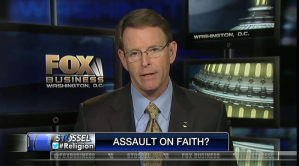
Tony Perkins, president of the conservative Family Research Council, debated with Fox Business commentator John Stossel about whether or not Christianity was under attack in the United States.
The debate, which aired on "Stossel" last week and was posted online on Monday, focused on whether or not there really was a "war on religion" in the United States. Stossel, a self-described agnostic libertarian, argued that most Americans claimed to be Christians, especially since the holidays of Christmas and Easter are celebrated openly in the country.
"This is a very religious country," Stossel said, citing a Gallup poll. "Ninety percent of Americans say they believe in God, [and] 40 percent say they go to church every week. In France and Germany, fewer than 10 percent go. In Denmark, [it's] 3 percent."
Stossel added that a significant number of Americans would not vote for a presidential candidate that was either Muslim or atheist. He then asked Perkins why he was raising such a fuss over the idea that American Christians are being persecuted in their own country.
"American Christians, other religious Americans are not losing their lives like they are in the Middle East," Perkins said. "But they are losing their rights. We're increasingly seeing the government come, and this line of separation that separates church from state is not being breached by the church. It's being breached by the state."
Perkins contended that the state "is taking away the rights of religious Americans." Stossel countered that such actions against Christians were "pretty rare."
"I don't think so," Perkins quipped. "I think that it has been increasing in the last 40 to 50 years. We've seen it in our school systems. We've seen it on college campuses."
Perkins then provided Stossel with an example of such an attack directed at Christians.
"When students, valedictorians, and salutatorians begin to give their commencement speeches, offer prayers, you see young people like Roy Costner, who simply wanted to give credit to where credit was due in his life," Perkins said.
Perkins added that although Costner was shut down after he gave credit to Jesus Christ, "[Costner] did it anyway." Stossel countered that the school board merely did not permit Costner, who graduated from Liberty High School in South Carolina, to recite "The Lord's Prayer" in his speech.
"He literally had to give a pre-approved speech. This is his personal speech," Perkins said. "He went through the process, but then on graduation day, he ripped up that speech and gave the speech he wanted to give."
After playing the video clip of Costner's speech, Stossel argued that event, which was made by "an idiot school board," and others like it were "isolated events."
"They're not so isolated," Perkins countered. "We have a document called 'Hostility to Religion.' It's a catalog of these cases where you have groups such as the Freedom from Religion Foundation threaten lawsuits, and because of tight budgets, oftentimes they back down.
Perkins added that the First Amendment freedoms of religious people were being violated on a regular basis.
"It's not isolated. It's becoming widespread in our culture today," Perkins said.
Stossel brought up the point that he wanted to be free from "religious coercion." Perkins agreed, noting that no one in the audience was forced to participate with Costner's speech in citing the Lord's Prayer.
"No one was going to go out there and make you move your lips to say the words, but others should be free to say it if they want to," Perkins said.
Perkins added that society is "better off when people do attend church, both individually and collectively." Stossel asked him to defend his assertion.
"We look at it in the numbers," Perkins said, citing government statistics. "Children, for instance, who grow up in homes where there's regular church attendance do better in their math and science scores. They're less likely to get involved in criminal behavior, less likely to become pregnant outside of wedlock. It has positive side effects for all."
Stossel then concluded by citing an article that claimed conservative Christians have lost in the public cultural battles of gay marriage, abortion and contraception. Perkins argued that the media has been saying that for years.
"It's amazing, when you look at the potential presidential candidates, how many of them are actually in the field vying for that social conservative vote," Perkins said. "Of the primary voters for Republicans [back in the 2012 election cycle], 50 percent were evangelical social conservatives, and in the general election it's over 25 percent. I don't think they're going away anytime soon."






